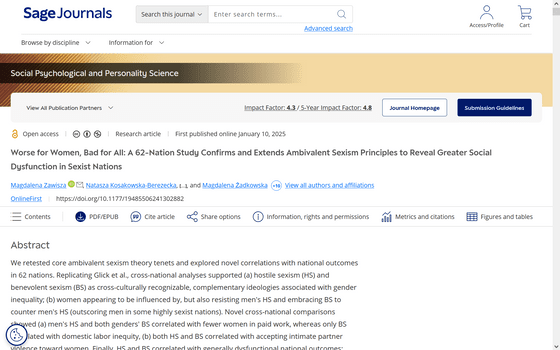Research shows that severe discrimination against women has a negative impact on both men and women

Although rights should not be suppressed just because one is a man or a woman, discrimination against men and women, such as restrictions on certain actions based on gender, still exists around the world. Based on her own research, Magdalena Zawisa, a gender psychology expert at Anglia Ruskin University in the UK, hypothesizes that 'the oppression of women affects both men and women.'
Worse for Women, Bad for All: A 62-Nation Study Confirms and Extends Ambivalent Sexism Principles to Reveal Greater Social Dysfunction in Sexist Nations - Magdalena Zawisza, Natasza Kosakowska-Berezecka, Peter Glick, Michal Olech, Tomasz Besta, Paweł Jurek, Jurand Sobiecki, Deborah L. Best, Jennifer K. Bosson, Joseph A. Vandello, Saba Safdar, Anna Włodarczyk, Magdalena Żadkowska, 2025

Sexism linked to social ills for men and women, finds largest cross-cultural study of its kind
Zawisa surveyed both men and women in 62 countries, including Argentina, Australia, Canada, China, Japan, the UK, Nigeria, South Africa and Vietnam, about gender discrimination, and also looked at other statistical data, such as violence against women, female labor force population, GDP, GPI, homicide rates and life expectancy, and correlated the survey results with them.
The results showed that the more oppression there is against women, the more likely it is that it will have an impact on men as well. For example, fewer women working full-time means less human capital, which leads to economic losses across the country and negatively impacts everyone, including men.

'It's just a correlation, it doesn't prove that sexism causes these problems,' Zawisa said, but he argued that there are likely other issues at play.
For example, a one-point increase in gender discrimination is associated with a 9.12-month decrease in life expectancy for men and 8.88 months for women.
Alternatively, communities with strong masculine norms may see men seeking help for psychological or medical problems as a sign of weakness, preventing them from getting help. 'These norms may lead men to be more aggressive or to engage in risky behaviors, such as not wearing seat belts, which can lead to health problems,' says Zawisa. Additionally, these norms may increase the likelihood of conflict.
For women, medical discrimination against them may result in poorer health outcomes, such as fewer medical studies on women than on men and their complaints being treated as less credible.

In addition, Zawisa argues that there are two types of sexism: benevolent sexism and malicious sexism. Benevolent sexism for women refers to actions that are seemingly kind but patronizing, such as offering men protection and support in order to encourage women to become full-time housewives. Similarly, malicious sexism for women refers to open hostility toward women and the desire to punish people like female politicians.
'Both benign and malicious sexism are correlated with anti-democratic tendencies, lower productivity, increased collective violence, and reduced health life expectancy for both men and women,' Zawisa said. 'Taken together, our research suggests that tackling gender discrimination is in the interest of women, men, and countries alike, for a better future for us all.'

in Science, Posted by log1p_kr